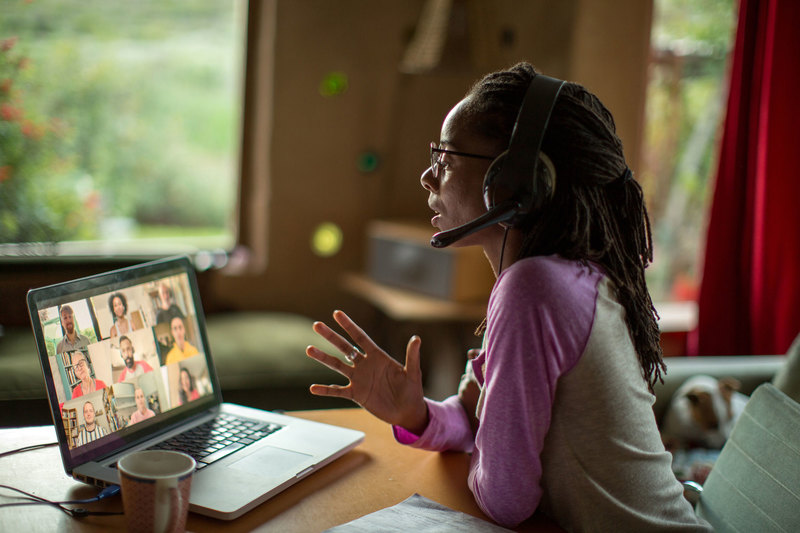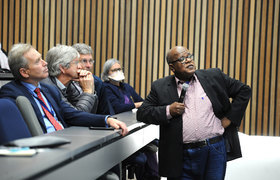OIC hosts webinar on transforming enterprises through diversity and inclusion
18 October 2022 | Story Stephen Langtry. Photo Getty Images. Read time 5 min.
The Office for Inclusivity and Change (OIC) at the University of Cape Town (UCT) hosted a webinar in collaboration with the International Labour Organization (ILO) and Business Unity South Africa (BUSA) on 29 September. The ILO undertook one of its most extensive global studies on enterprise approaches to diversity and inclusion (D&I). The survey results sought to create new understanding and insights on D&I actions, scope, drivers and priorities to support enterprises going forward in creating powerful and impactful change. The ILO also published a South African country profile report earlier this year.
The webinar was convened by Undere Deglon, an inclusivity culture change specialist at the OIC. Deglon said that the purpose of the webinar was to “learn from some of the lessons uncovered during the ILO global study, which was done on transformation through diversity and inclusion and more specifically, to learn about some of the lessons that are articulated in the South African country report.”
In her welcoming address, Deputy Vice-Chancellor for Transformation, Student Affairs and Social Responsiveness Professor Elelwani Ramugondo said, “Diversity must be firmly coupled with intentional and sustained inclusion practices.”
Stefan Tromel and Jae-Hee Chang presented an overview of the global study that was conducted. Tromel has worked as the senior disability specialist in the ILO since 2013. He previously worked as the executive director of the International Disability Alliance and as the director of the European Disability Forum, and was actively involved in the negotiation process of the United Nations Convention on the Rights of Persons with Disabilities. Chang is the senior programme and operations officer at the ILO. She works with a global team of professionals who form the link between the ILO and its employer constituencies in ensuring that business priorities are reflected in global policy making on social and labour issues.
Taking action on diversity and inclusion
The study was two years in the making and took on a global perspective, with survey responses from 75 countries. Three questions were addressed: What drives organisations to take action on D&I that really makes a difference?; What factors contribute to different employee groups feeling included at work? and what approaches to D&I have the most impact?
“There is no ‘one size fits all’ when it comes to successful D&I strategies.”
The three top drivers for D&I were compliance with legal obligations; supporting and improving the well-being of employees; and attracting, developing and retaining the best talent. The study found that the experience of inclusion was felt more by employee groups higher up in hierarchical levels.
Approaches to D&I that had the most impact were strategic and cultural change approaches; building diversity at the top; co-creating shared responsibility and accountability for D&I; and embedding D&I into the employee lifecycle and organisational activity.
“There is no ‘one size fits all’ when it comes to successful D&I strategies,” said Chang. Businesses have created different ways to track the benefits of their D&I efforts. Monitoring of D&I efforts should include a focus on diversity as well as on inclusion. A good approach to measuring D&I progress was by regular all-staff surveys measuring inclusion at three levels: overall inclusion; experience of the factors contributing to inclusion; and experience of the benefits of inclusion.
Accountability for diversity and inclusion
Attwell Magogodi, the group employee relations manager at Bushveld Minerals and a member of BUSA through the Minerals Council South Africa, made a presentation on behalf of BUSA. “What the ILO has validated is that the overarching objective of D&I is predicated on a notion of a growth mindset,” he said. He pointed out that if one has a diverse workforce, there will be growth as an organisation. “You would not have a functional economy without an inclusive society.”
“You would not have a functional economy without an inclusive society.”
Professor Kurt April from the UCT Graduate School of Business (UCT GSB) introduced his presentation, titled “Justice, Equity, Diversity and Inclusion: The University Response?” by saying that he was surprised by the findings on South Africa in the ILO report. He referred to the particular case of the mining industry where women accounted for only 17% of senior management. This was evidence of clear systemic discriminatory practices. While there were great policies and strategies, in this case, women were not included on psycho-social levels.
“Many people conflate employment equity [and] affirmative action with broad-based black economic empowerment and actual inclusion,” he said. “So, a lot of our managers and senior managers will say, ‘I’m accountable for diversity and inclusion,’ meaning we have legislative requirements to actually report on these things.”
Deglon concluded the webinar by thanking the participants for “drawing out the connection between belonging and well-being, and the costs that are associated with exclusion”.
 This work is licensed under a Creative Commons Attribution-NoDerivatives 4.0 International License.
This work is licensed under a Creative Commons Attribution-NoDerivatives 4.0 International License.
Please view the republishing articles page for more information.










